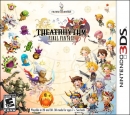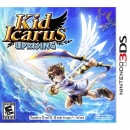RolStoppable said:
I skimmed through the replies and saw people saying that this is a good writeup. That tends to make me suspicious, so I began to read the original post in earnest. Unsurprisingly, it repeats many of the flawed views that people have accepted as the truth despite evidence to the contrary being out there.
2011
The stage for a dark age is set in advance. If you understand that, then the beginning of the dark age is E3 2010, a press conference that was actually widely agreed upon to be great. But it's at that time that the 3DS was unveiled, the console that led to Nintendo's first loss over the course of a full financial year since they had entered the video game business. People are always quick to blame everything on the Wii U because they only look at unit sales, but it's the 3DS that began to dig the hole. Nintendo fully banked on stereoscopic 3D selling the hardware, so they didn't prepare much first party software in parts because of that; their other reason to go soft with Nintendo games is that they believed that fewer Nintendo games will lead to higher sales of third party software. The fundamental flaw in this thinking is that third party software is rarely good enough to sell Nintendo hardware, therefore such a strategy hurts everyone. The correct approach is to go hard on Nintendo games, because that boosts hardware adoption rate and everyone benefits.
The complacence regarding the 3DS created a domino effect. Nintendo did not only have to take their first loss in the fiscal year ending March 2012 because of the early 3DS price cut, but they also had to pull developers from Wii U projects to finish key titles for the 3DS faster. The eventual result of that was the completely broken software pipeline for the Wii U, because Wii U games had to be delayed in the aftermath of getting the 3DS back on track.
2012
The Wii U's main problem was not the name, not the marketing, and least of all it wasn't that "people were put off by the Wii." The Wii U's problem was the exact opposite: It wasn't a proper successor to the Wii. The most obvious key factor is that Nintendo relegated Wii Remote and Nunchuk to a tertiary control option and didn't even bother to provide improved versions, but rather just said that people should buy the Wii accessories. That's the same strategy they used during the transition from GameCube to Wii when GC controllers were a tertiary control option, but consider that for Wii it was a sound strategy because the GC was a failure. It's perfectly fine to make drastic changes after a failure and pursue a different direction. However, it is completely braindead to reject your success and return to an evolution of a concept that already failed you before. The Gamepad is the evolution of the GC to GBA connectivity; if the control setup isn't obvious enough, consider that Nintendo Land incorporated gameplay of various GC to GBA connectivity titles. The Wii U's main problem was that it was a repackaged GC and the market saw through it, so the Wii U followed the GC trajectory in sales.
Your summary of Wii U games is terrible. You call Pikmin 3 long-awaited when it is an IP that has never sold much on any console; Pikmin is utterly forgettable and disposable when it comes to hardware sales. New Super Mario Bros. U keeps getting the blame for sinking the Wii U, but in reality it is the only thing that kept it from doing even worse. Consider these two important factors: For one, NSMBU had an attach rate of ~60% in the early going because it was just about the only game worth buying on Wii U, and two, every single Nintendo IP has failed to turn around the Wii U afterwards, including Mario Kart 8 which proved its real system-selling power on Switch three years after its Wii U release. What you have with Wii U is similar to a Virtual Boy situation where it doesn't matter how good the software is, because the market doesn't want the hardware. Of course the Wii U was not as bad as the Virtual Boy, but if that's the only thing Wii U can outdo, you have a real mess on your hands.
You call the Wii U's launch a success, but it absolutely wasn't. Not only did it miss its forecast, but its sell-through was terrible on top of that. That's why shipments in the following quarters were abysmal, because the system had already failed at launch.
2013-2014
Third party support for Wii U was already on its way out at E3 2012. By December 2012 there was a list floating around on the internet that showed that ~80% of announced multiplatform games were not in development for Wii U. Remember, that was still before the PS4 and Xbox One, so processing power had nothing to do with those decisions. And remember, at that time third parties couldn't have made their decisions based on sales either, because sales data had yet to come in.
The crucial point you forget to mention for this period is January 2014. Nintendo revised its shipment forecast for Wii U down by 6.2m, from 9m to 2.8m. Satoru Iwata talked about Nintendo's next generation in January 2014. While Iwata had allowed the company to go ahead with its headscratching decisions to make the 3DS and Wii U, he had come to his senses at that point. He knew that the current generation (3DS and Wii U) were all about damage control at that point, and that he had to plant the correct seeds for their successors.
Nintendo had no faith in Wii U anymore. Their forecast for Wii U for the fiscal year ending March 2015 was 3.6m, a pathetic figure. The reason why Nintendo kept releasing Wii U games for years after they had recognized that it is a failure is that Nintendo is in it for the long term. They couldn't expect people to buy another console of theirs if they stopped supporting their current one.
2015-2017
It doesn't matter if you believe NX wasn't announced because of the announcement of Nintendo making mobile games, all it means is that you are wrong. Announcing the next console generation at that point in time instantly curbstomped all speculation that Nintendo might stop making consoles.
The main purpose of Nintendo's mobile games is to raise IP awareness and get people to buy Nintendo consoles and games. That verifiably worked.
What ties into this same strategy are Nintendo's Mini consoles which also raise awareness. That too works.
Why the Wii U failed
I already touched on this earlier in this post before I even read what you wrote here. I've been typing my response in pieces, reading one of your sections and then immediately writing a response. You wrote a lot in this particular section without identifying the real causes.
Conclusion
Your essay is okay as your personal perspective, but nobody should take it as a history lesson, because your essay has holes like a swiss cheese when it comes to financial matters.
|



















































